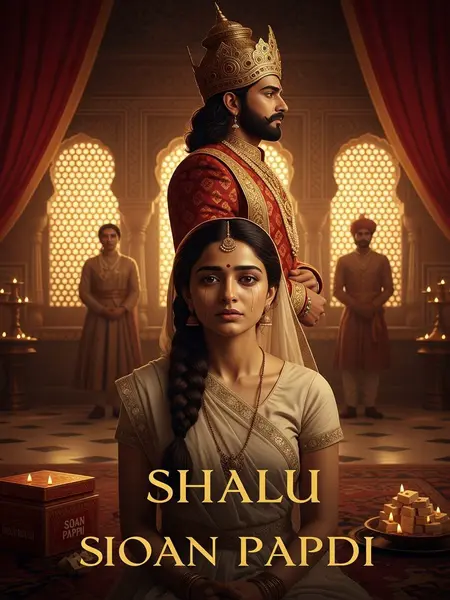Chapter 3: Hunger, Humiliation, and a Promise
A choti rani from the west wing once told me my Amma was diya-keeper maid of the Maharani’s quarters. Her perfume lingered after she left, her words sharp as green chillies. She’d smirk, but I’d listen, each word heavy in my heart.
When Maharani fell ill, Raja Saheb picked Amma—a maid—for one night. In these walls, such choices change lives. Amma had one year left before freedom, her havildar fiancé waiting. I imagine her dreams: a little home, a simple wedding. The old guard told me they’d pass secret notes in paan leaves. Their love was sweet, but the palace is no place for innocence.
She begged Raja Saheb to spare her, but he grew angry, forced himself on her, then sent her to lonely Rajnivas. I remember her sobs at night, prayers whispered to Devi. The palace grew colder after that.
Even after Amma carried me for ten months and gave birth, he never visited. On birthdays, other princesses got gifts; I got silence. In the register, there’s only a blank space beside my birth. Sometimes I’d stare, trying out names, but none fit.
Raja Saheb still looked at me like an old ledger—debts he’d never settle. He smiled politely, "Choti Shalu, what do you want from Raja Saheb?" For a moment, I mattered. "I want to get married." My voice was steady, but my knees ached. The room burst into laughter. Raja Saheb patted my head as if I were his favorite child. "Who does Shalu want to marry? Should Raja Saheb grant you a wedding?"
The old munshi adjusted his specs, "I heard Princess Shalu is close to Grand Tutor Kabir." The room tittered. Raja Saheb raised his brows, "Choti Shalu likes Grand Tutor Kabir?" All eyes turned to Kabir, who looked like he wanted to vanish.
I knew Kabir didn’t like me—not like that. He was good, but distant. We met when he saw me forced to crawl for coal. He scolded the bullies, gave me some cash, and left. He was Yuvraj Bhaiya’s tutor, and I wanted to become smart. The old washerwoman said, "Padho, bitiya, then you’ll be clever." So I’d hide, listening to Kabir’s lessons. Only one line stuck: "This world is but a grand illusion; how many monsoons have come and gone?" I wrote it inside my shawl, afraid to forget.
But then, at a palace banquet, some rich brats mocked me, offered sweets if I’d recite dirty jokes. I didn’t know what a housemaid was, but the promise of food was enough. Kabir saw, dragged me away, scolded me harshly: "You’re a Rajpur princess—don’t throw yourself at anyone for food! Be proud, like Third Princess!" I shrank under his words, fiddling with my dupatta, tears streaming. I didn’t know what I’d done wrong—Amma raised me to survive. After she died, I lived the only way I knew. In the harem, it was always our rations cut first. If a favored wife ran out of coal, we froze. Hunger made me do anything—even recite jokes a thousand times for a scrap of dal. Kabir’s anger made me question if I should feel ashamed.
He left, gifts gone from my window. I curled up in Rajnivas, learning to keep my head down. Even a half-eaten samosa in the dog’s bowl was a feast.
Until one day, caught eavesdropping on Kabir’s lesson, the guards beat me. Their lathis rained down, my cries echoing, but no one came. Third Princess saved me, dabbing balm on my wounds. Amma always said, "Zindagi ka karz mat bhoolna." I vowed to repay Third Princess, whatever the cost.








